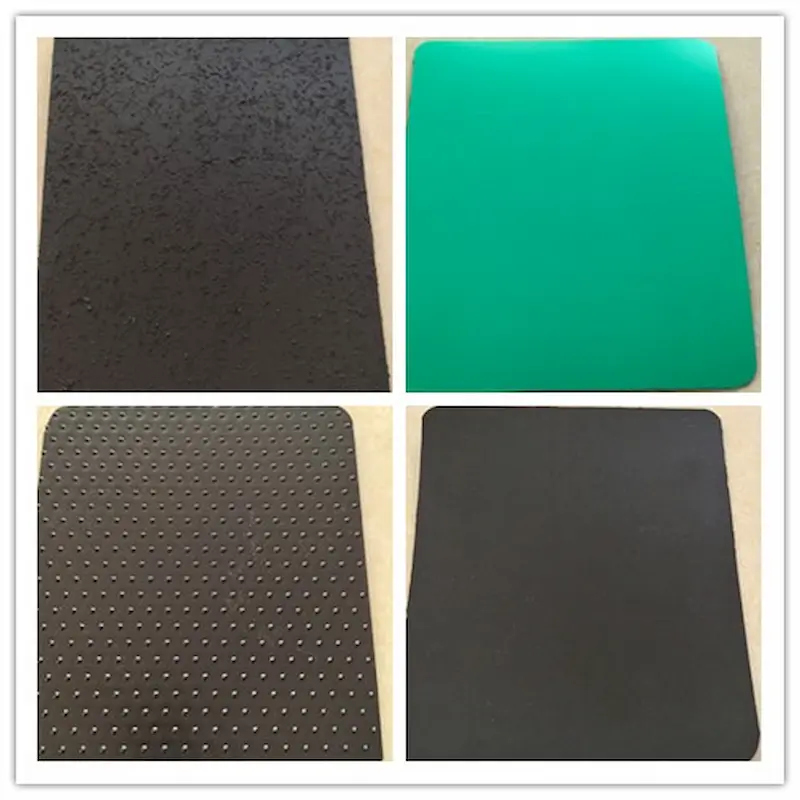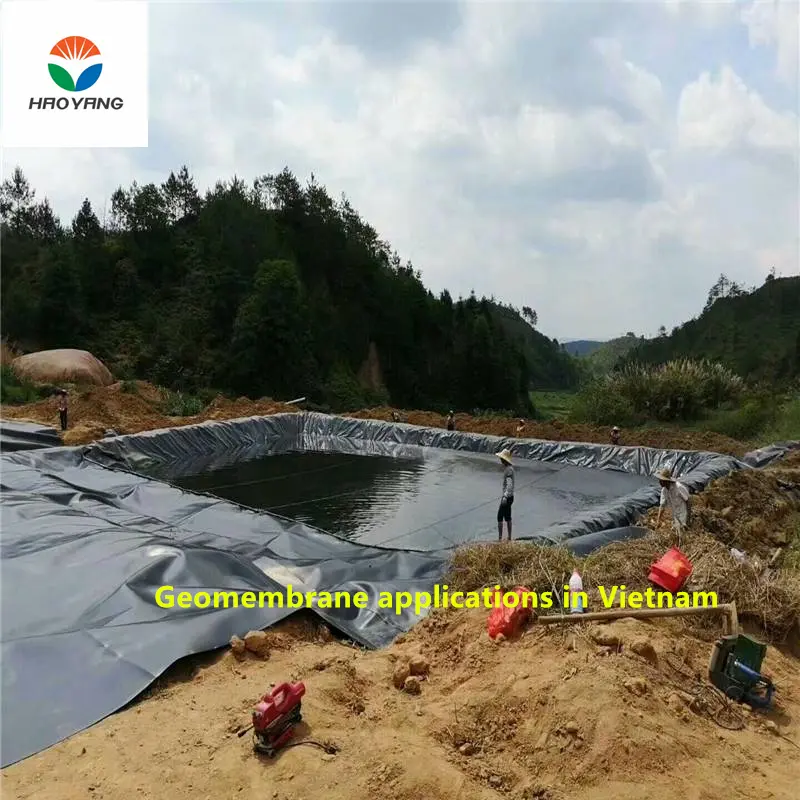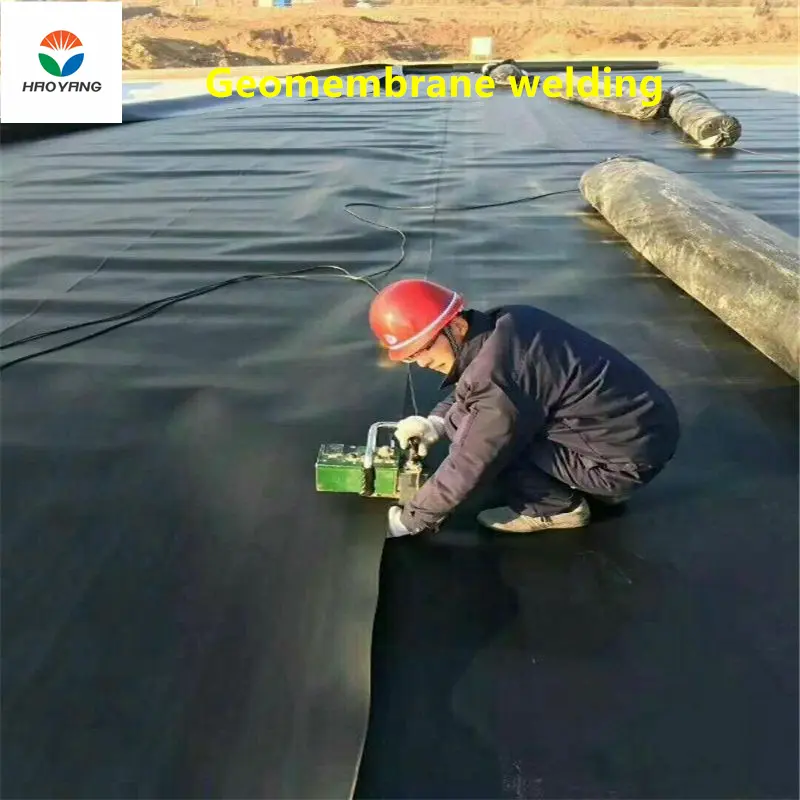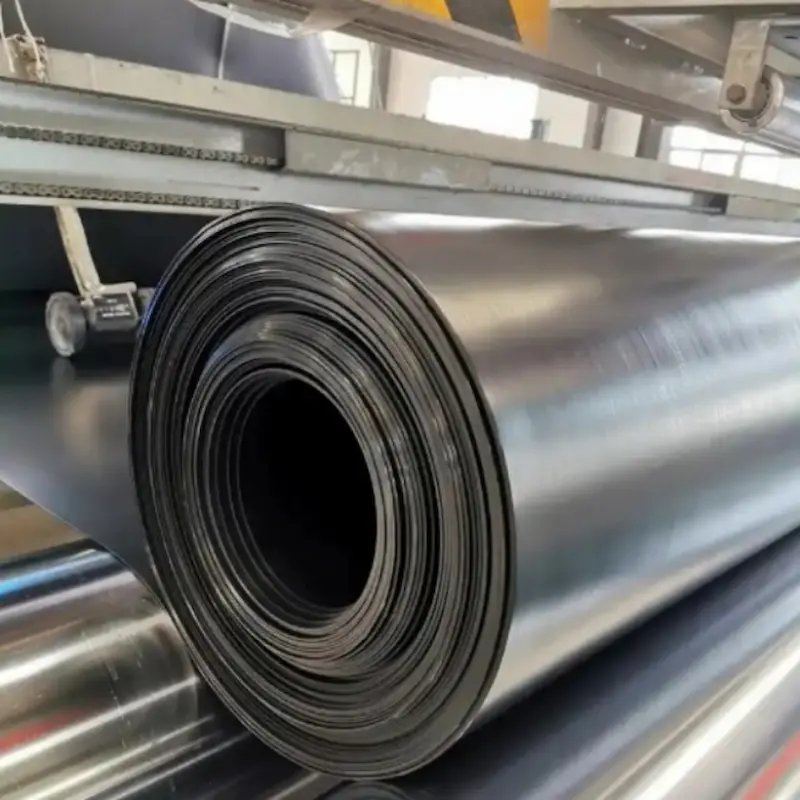Ø What is HDPE geomembrane?
HDPE geomembrane is a waterproof barrier material produced by high-density polyethylene resin with a density of 0.94g/cm or above

Ø What are the characteristics and properties of HDPE geomembrane?
The properties and characteristics are as follows:
1. Physical property
Good flexibility: With high flexibility, can adapt to different shapes and terrain of the base, such as uneven ground or complex slope laying, can closely fit the base surface.
Light and easy construction: light weight, easy to carry and lay, high construction efficiency, at the same time, its coil form is easy to cut and splice, customized construction.
2. Mechanical property
High strength: It has high tensile strength and yield strength, can withstand greater tension and pressure, and is not easy to be stretched or torn.
Good extensibility:elongation at break is generally about 700%~800%, with good elasticity and extension properties, can adapt to geological uneven settlement and foundation deformation.
3. Chemical property
Corrosion resistance:Good tolerance to most acids, alkalis, salts and other chemicals. It can resist the corrosion of strong acid, alkali and oil, and is a good anti-corrosion material.
Aging resistance: with excellent anti-aging, anti-ultraviolet performance, long service life, generally up to 50 years or even longer.
4. impermeability
Low permeability: the anti-seepage coefficient is very small, generally less than 1×10⁻¹³cm/s, with good waterproof barrier performance, can effectively prevent the penetration of liquids and gases.
5. Environmental friendliness
Non-toxic environmental protection: The materials used are non-toxic environmental protection materials, do not contain harmful substances, will not cause pollution to the soil, water and air and other environments, can be used in environmental protection, aquaculture, drinking pools and other areas with high environmental requirements.
Ø HDPE geomembrane Price
Geomembrane types | Thickness | Price range (USD/m2) |
HDPE geomembrane | 0.75mm | 1.25-1.33 |
HDPE geomembrane | 1.0mm | 0.8-4.0 |
HDPE geomembrane | 1.5mm | 0.32-0.87 |
HDPE geomembrane | 2.0mm | 0.34-0.71 |
Notice:The price of geomembrane in the Vietnam market may vary due to import duties, transportation costs, local supply and demand relations and other factors
Ø HDPE geomembrane production technology
1. Ingredients and mixing:
The high density polyethylene (HDPE) original resin and carbon black masterbatch, anti-aging agent, antioxidant, ultraviolet absorber, stabilizer, etc. are fully mixed in the mixing equipment according to a certain proportion to ensure the uniform dispersion of additives.
2. Extrusion:
The mixed raw materials are put into the extruder, heated to a molten state at high temperature, driven by the rotation of the screw, and extruded into continuous sheets with a certain thickness and width by a specific mold.
3. Blow molding or calendering:
When the blow molding process is used, the extruded sheet is blown into a cylindrical film with a certain diameter and thickness through the blow expansion device, and then shaped by air cooling or water cooling; The calender process is to roll the molten plastic into a film of specified thickness and width through multiple rollers of the calender machine.
4. Tensile treatment:
longitudinal and transverse stretching of the preliminarily formed film to improve tensile strength, elongation at break and other mechanical properties, tensile methods are hot tensile and cold tensile, tensile multiple and other parameters are adjusted according to product performance requirements.
5. Edge cutting and winding:
the edge cutting equipment is used to cut the uneven part of the film edge, and then the geomembrane after the edge is wound into a roll through the winding device, which is convenient for storage and transportation.
6. Quality testing:
In the production process and the finished product stage, the thickness, tensile strength tester, drop hammer impact testing machine and other equipment are used to test the thickness of geomembrane, tensile strength, tear strength, puncture resistance, environmental stress cracking resistance and other indicators.
Ø Parameters of HDPE geomembrane
Project | Unit | Index (thickness corresponding value) |
Thickness | mm | 0.30、0.50、0.75、1.00、1.25、1.50、2.00、2.50、3.00 |
Density | g/cm³ | ≥0.940 |
Tensile yield strength | N/mm | ≥4、≥7、≥10、≥13、≥16、≥20、≥26、≥33、≥40 |
Tensile fracture strength | N/mm | ≥6、≥10、≥15、≥20、≥25、≥30、≥40、≥50、≥60 |
Right-angle tearing load | N | ≥34、≥56、≥84、≥115、≥140、≥170、≥225、≥280、≥340 |
Resistance to puncture | N | ≥72、≥120、≥180、≥240、≥300、≥360、≥480、≥600、≥720 |
Carbon Black Content | % | 2.0~3.0 |
Ø Application field of HDPE geomembrane
1. Water conservancy facilities:
such as reservoirs, levees, irrigation channels, etc., HDPE geomembrane has obvious advantages in seepage prevention and reinforcement, and improves the utilization efficiency of water resources.
2. Transportation facilities:
In the construction of roads and railways, HDPE geomemofilm has a wide range of applications for subgrade reinforcement, slope protection, and prevention of reflection cracks, etc., to adapt to the complex terrain and traffic construction needs of Vietnam.
3. Environmental protection facilities:
Taking landfills and tailings DAMS as examples, HDPE geomembrane plays a key role in preventing pollution and protecting the environment, and it plays an indispensable role in the construction of environmental protection infrastructure in Vietnam.

Ø Technical advantages and influence of HDPE geomembrane
1. Performance advantage:
The impermeability, corrosion resistance, aging resistance and other properties of HDPE geomemofilm are suitable for the complex climatic and geological conditions in Vietnam. Vietnam is hot and rainy, and the soil in some areas is highly corrosive, geomembrane can effectively meet these challenges with its own characteristics to ensure the quality and durability of infrastructure.
2. Construction convenience:
HDPE Geomembrane has absolute advantages over other traditional materials in construction, easy installation, short construction period and so on. In infrastructure construction projects in Vietnam, the actual situation of shortening construction time, reducing manpower and equipment input due to the use of HDPE geomembrane, and the positive impact on the overall progress of the project.

Ø Economic and social benefits of HDPE geomembrane
1. Economic benefits:
From the perspective of cost analysis, reduce construction costs, such as material costs, transportation costs, etc. Reduce post-maintenance costs and compare the long-term maintenance costs of infrastructure with and without geomembrane. At the same time, HDPE geomembrane brings economic benefits to improve the use efficiency of infrastructure, such as the increased water resource utilization value due to the good anti-seepage effect in water conservancy facilities.
2. Social benefits:
The application of HDPE geomembrane plays a role in ensuring people's livelihood in Vietnam, such as ensuring agricultural irrigation water in water conservancy facilities and stabilizing grain production; Ensure transportation safety in transportation facilities and promote exchanges and development between regions. Contributions to environmental protection can also be mentioned, such as preventing pollution in environmental protection facilities such as landfills, protecting the ecological environment and the health of residents.
Ø Summarize
HDPE Geomembrane is crucial in the field of infrastructure construction in Vietnam. In water conservancy engineering, it can effectively prevent seepage, ensure water resources utilization and engineering safety; In the traffic construction, it can strengthen the soft ground and prevent the settlement of the road surface; In terms of environmental protection facilities, preventing landfill leachate from polluting soil and groundwater is of great significance to the stability and environmental protection of Vietnam's infrastructure.

897.webp)
942.webp)
237.webp)